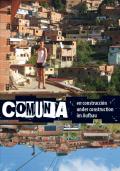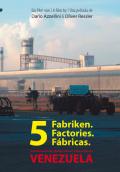All english articles
Dario Azzellini and Oliver Ressler at the Nottingham Contemporary
The Geopolitical Turn - Art and the Contest of Globalisation
What are the reference points for contemporary art in a global economy that creates enormous wealth as well as widening inequality. Our opening conference explores the many strategies artists use to reveal the processes and human consequences of the globalised market economy. Introduced by the exhibition’s co-curator T.J. Demos – writer, curator and lecturer at University College, London – the conference includes artists George Osodi, Ursula Biemann, Dario Azzellini, Oliver Ressler and Bureau d’Études.
You are missing some Flash content that should appear here! Perhaps your browser cannot display it, or maybe it did not initialize correctly.
Termine:
Comuna under construction - DMVI Film Festival
DMV International Film Festival presents:
Comuna en construcción / Comuna under construction
25.6.2010, 6:10 pm - 7:44 pm, Goethe Institute, 812, 7th Street, NW, Washington DC
26.6.2010, 10:10 am - 11:44 am, AXUM Lounge, 1346, 9th Street, NW, Washington DC
26.6.2010, 12:35 pm - 2:04 pm, Goethe Institute, 812, 7th Street, NW, Washington DC
Termine:
The Geopolitical Turn: Art and the Contest of Globalisation
What are the reference points for contemporary art in a global economy that creates enormous wealth as well as widening inequality. Our opening conference explores the many strategies artists use to reveal the processes and human consequences of the globalised market economy. Introduced by the exhibition’s co-curator T.J. Demos – writer, curator and lecturer at University College, London – the conference includes artists George Osodi, Ursula Biemann, Dario Azzellini, Oliver Ressler and Bureau d’Études.
Termine:
Uneven Geographies
Éduardo Abaroa, Azzellini & Ressler, Yto Barrada, Ursula Biemann, Bureau d’Études, Öyvind Fahlström, Goldin + Senneby, Mark Lombardi, Steve McQueen, Cildo Meireles, George Osodi, Bruno Serralongue, Mladen Stilinović, Yang Zhenzhong
Uneven Geographies brings together the work of artists from five continents who find experimental ways of capturing the processes of globalisation, and its human consequences in various regions of the world.
Curated by T.J Demos and Alex Farquharson
Termine:
From comanagement to factory councils
Dario Azzellini: From comanagement to factory councils: reorganizing property and administration of means of production in Venezuela
Immanuel Ness: New Factory Occupations and Worker Control in North America
Marie Trigona: Occupy Everything!: Factory occupations and worker self-management in Latin America strategies for social emancipation
Termine:
International Labour Process Conference
Stream 6: Alternative Work Organisations,
organized by
Maurizio Atzeni, Loughborough University, UK,
Dario Azzellini, Johann Wolfgang Goethe University, Germany,
Immanuel Ness
Termine:
Popular Power and the Socialist Model: A Look at Venezuela's Path to Socialism
With Camila Piñeiro Harnecker and Dario Azzellini
Termine:
Left Forum 2010: The Center Cannot Hold: Rekindling the Radical Immagination
Saturday, 20 March, 10:00 AM - 12:00 PM, W613
Alternative Labor Organizations: Worker Councils and Rank-and-File Control
Working USA: The Journal of Labor and Society
Immanuel Ness (Chair) - Brooklyn College/City University of New York
Dario Azzellini - Benemerita Universidad Autonoma de Puebla
Maurizio Atzeni - Loughborough University, UK
Peter Ranis - City University of New York (Emeritus)
Alan Tuckman - University of Nottingham
Victor Wallis - Socialism and Democracy Berklee College of Music
Termine:
Comuna Under Construction
Screening „Comuna – Under Construction“, documentary film on Venezuela
Comuna Under Construction
“We have to decide for ourselves what we want. We are the ones who know about our needs and what is happening in our community”, Omayra Peréz explains confidently. She wants to convince her community, located on the hillside of the poor districts of Caracas, to found a Consejo Comunal (community council). In more than 30.000 Consejos Comunales the Venezuelan inhabitants decide on their concerns collectively via assemblies. Omayra is supported by the activists of the nearby shantytown “Emiliano Hernández”, which has had a Consejo Comunal for three years already.
Interview with Dario Azzellini
„Wars are not something accidental, no rare they due too bad characters“
What is it about Venezuela that is so interesting?
Since 2003 I have practically lived in Venezuela. What motivates me is that I am interested in the social transformation process happening here. It’s a different type of revolution, a new left that draws from all the experiences of the 60s, 70s, 80s and 90s. ...
collective ownership, expropriation, and workers self-management
Venezuela’s solidarity economy
The essay appraises and analyzes different organizational efforts of the Bolivarian government in Venezuela to achieve a democratization of property and management of means of production. The different approaches adopted since 2000 (first a strengthening of cooperatives, then the creation of Social production companies [EPS] and finally the Socialist Enterprises as well as the concept of endogenous development, normative orientation of production organization, and state job training) are described and critically analyzed.
Debate with Dario Azzellini, Bernd Wulffen und Yaotzin Botello
Latin America - Back on the Agenda?
DW-TV´s international talk show with four journalists discussing the week´s top international issue. This panel of foreign correspondents and German journalists exchanges views on key political, business and cultural topics in the exclusive Quadriga studio right next to Berlin´s Brandenburg Gate. Thirty minutes of guaranteed exciting debate spotlighting their take on world events.
Colombian Paramilitaries in Venezuela: One More Destabilizing Factor
»A war of attrition such as that in Nicaragua is much more effective«
Dario Azzellini, the Italian-German political scientist, writer and documentarian, has conducted an in-depth investigation of the phenomenon of paramilitarism in Colombia. In 2003 he published the book “The Privatization of War,” some parts of which have run in “Txalaparta” in Spain and in “Question” in Venezuela.
On contemporary Caracas Arthur
Fear and the City
In an old Venezuelan folk song, caraqueno musician Johnny Quiroz eulogizes his city; “Caracas, ciudad hermosa, tu eres bella, Caracas” glows the popular chorus, proclaiming the city’s beauty. To a contemporary North American audience, however, Quiroz’ civic boosterism might come as a bit of a shock. Caracas, we are told, is a city in sharp decline. In recent years, news agencies have inundated us with stories chronicling the Venezuelan capital’s unraveling; narratives of homicide, kidnapping, and widespread violence have become central features of mainstream renderings of the city.
The privatization of military services is a worldwide business
„The Privatization of War“
A mapping project done in collaboration with Lize Mogel, is published in the Brooklyn Rail this month. it's been scaled down and edited from a much larger size, but still suitable for framing. If you don't live in Brooklyn or can't find a copy of the Rail, you can also download the map online at: http://www.brooklynrail.org/2007-02/express/pirvatization
Colombia as Laboratory and Iraq as Large-Scale Application
The Privatization of War
The privatization of military services is a worldwide business worth $200 billion a year. PMCs are an enormous part of this economy, offering "products" from logistics (such as building and managing military camps and prisons) to strategic support (radar and surveillance) to open combat and special sabotage missions. PMC corporations are based globally, and recruit heavily in the global south.
5 Factories – Worker Control in Venezuela
In their second film regarding political and social change in Venezuela, after “Venezuela from Below”, Azzellini and Ressler focus on the industrial sector in “5 Factories–Worker Control in Venezuela“. The changes in Venezuela's productive sphere are demonstrated with five large companies in various regions: a textile company, aluminum works, a tomato factory, a cocoa factory and a paper factory. The workers are struggling for different forms of co- or self-management supported by credits from the government.

























